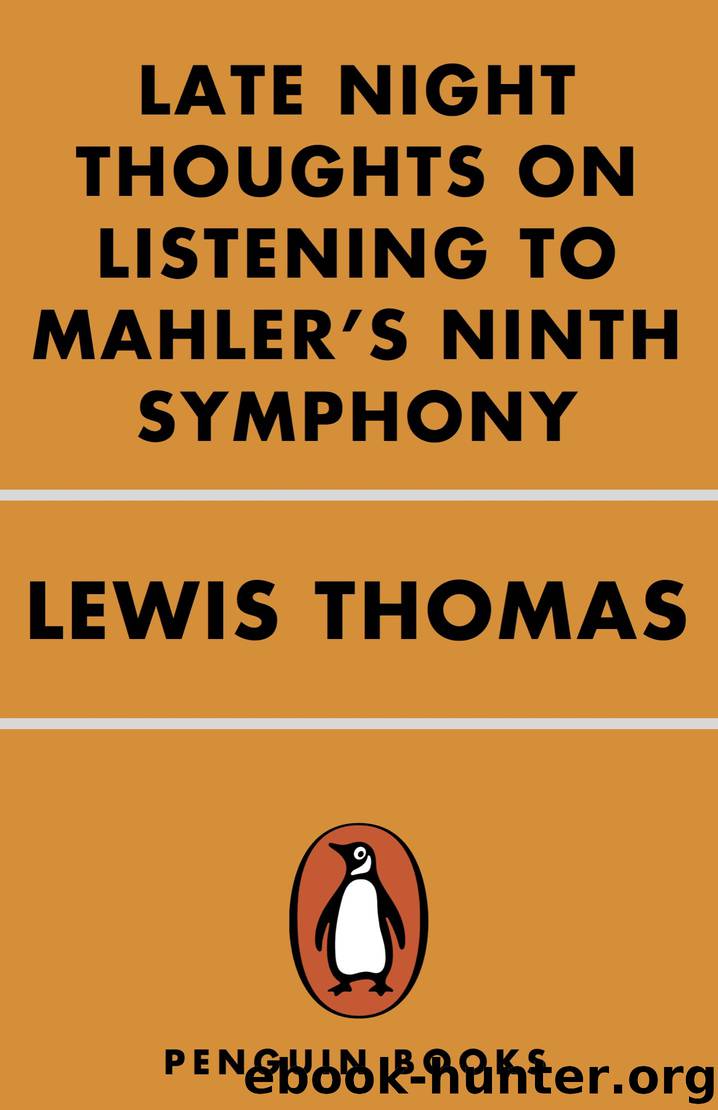Late Night Thoughts on Listening to Mahler's Ninth Symphony by Lewis Thomas

Author:Lewis Thomas
Language: eng
Format: epub
Publisher: Penguin Publishing Group
Published: 1995-04-30T16:00:00+00:00
SCIENCE AND “SCIENCE”
I remain puzzled over how to classify the science and technology underlying nuclear warfare. Because of the high degree of uncertainty involved in this sort of research, as well as the ambiguity and unpredictability of its outcome, I asserted earlier that it should be classed as entirely basic science, by definition, and should therefore be subject to the same budgetary constraints as all the rest of basic research in the nation.
Since then I have changed my mind. I recant, partly under the influence of the Defense Department’s latest announced R & D plans for fighting a “protracted” nuclear war. I take it back. This kind of military research is not at all like any science I have ever heard of, basic or applied. It is a new, peculiar kind of endeavor for which some other term must be invented. It resembles, more closely, an endless game. I suppose you could argue that scientific research is also a sort of game, but there is a difference: ordinary games finish at some point; there are winners and losers. Neither of these seems possible under the rules of nuclear “science,” and the game seems designed to go on forever. I have placed the word in quotation marks, provisionally, until I can think of a suitable euphemism.
There are many differences, but one that is decisive and compelling. In science in general, one characteristic feature is the awareness of error in the selection and pursuit of a problem. This is the most commonplace of criteria: if a scientist is going to engage in research of any kind, he has to have it on his mind, from the outset, that he may be on to a dud. You can tell a world-class scientist from the run-of-the-mill investigator by the speed with which he recognizes that he is heading into a blind alley. Blind alleys and garden paths leading nowhere are the principal hazards in research.
Everyone in science knows about this, although it is not much talked about. Most scientific hypotheses, including what seem the brightest and best, turn out to be wrong. I would guess that the luckiest and most productive of investigators is right in his original notion, the guess with which he starts his work, about once out of a hundred tries, at his peak. What counts is his instinct for spotting wrongness, his willingness to give up on a favorite conviction, his readiness to quit and shift to a better project. Insoluble problems abound. It takes almost as much good judgment to recognize these when they turn up as to perceive quickly the ones that can be settled, solved, nailed down once and for all by research.
There are two ways of clouding the vision of a working scientist in making this discrimination (assuming that he is of average intellectual stature). One is money. If the funds for a particular research project are coming in over his head in cascades, the scientist may be misled into thinking that he is on to a good thing, no matter what his data show.
Download
This site does not store any files on its server. We only index and link to content provided by other sites. Please contact the content providers to delete copyright contents if any and email us, we'll remove relevant links or contents immediately.
| Cell Biology | Developmental Biology |
| Entomology | Marine Biology |
| Microbiology | Molecular Biology |
| Biostatistics |
Sapiens: A Brief History of Humankind by Yuval Noah Harari(14366)
The Tidewater Tales by John Barth(12651)
Mastermind: How to Think Like Sherlock Holmes by Maria Konnikova(7320)
Do No Harm Stories of Life, Death and Brain Surgery by Henry Marsh(6934)
The Thirst by Nesbo Jo(6932)
Why We Sleep: Unlocking the Power of Sleep and Dreams by Matthew Walker(6701)
Life 3.0: Being Human in the Age of Artificial Intelligence by Tegmark Max(5547)
Sapiens by Yuval Noah Harari(5365)
The Body: A Guide for Occupants by Bill Bryson(5080)
The Longevity Diet by Valter Longo(5058)
The Rules Do Not Apply by Ariel Levy(4957)
The Immortal Life of Henrietta Lacks by Rebecca Skloot(4572)
Animal Frequency by Melissa Alvarez(4459)
Why We Sleep by Matthew Walker(4434)
The Hacking of the American Mind by Robert H. Lustig(4375)
Yoga Anatomy by Kaminoff Leslie(4358)
All Creatures Great and Small by James Herriot(4311)
Double Down (Diary of a Wimpy Kid Book 11) by Jeff Kinney(4261)
Embedded Programming with Modern C++ Cookbook by Igor Viarheichyk(4173)
